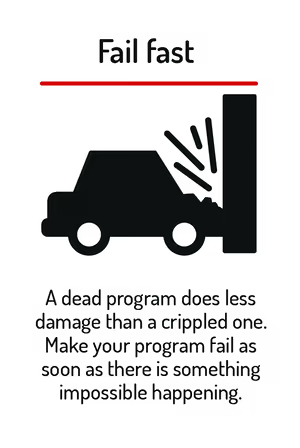Fail fast

Fail fast means detecting problems as early as possible instead of letting the program continue in an invalid state. A program that crashes immediately with a clear error is easier to debug than one that continues silently and produces wrong results.
Bad example:
public void setAge(int age) {
if (age < 0) {
age = 0; // silently fix invalid input
}
this.age = age;
}Here the program continues, but invalid data quietly slips in. Bugs may appear later far from the source.
Better example:
public void setAge(int age) {
if (age < 0) {
throw new IllegalArgumentException("Age cannot be negative: " + age);
}
this.age = age;
}Now the program immediately signals the problem. Developers see the error where it happens, making debugging and maintenance much easier.
Fail fast applies to null values, invalid arguments, inconsistent states, or unexpected conditions. Use exceptions, assertions, or validation checks to catch impossible scenarios early.
Before committing, ask: Does my code detect impossible or invalid states immediately, or does it silently continue? Failing fast saves time, prevents cascading errors, and makes your code more robust.